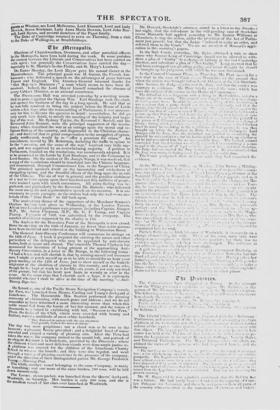be „Metropolis.
Elections of Churchwardens, Overseers, and other parochial officers in the Metropolis, have been held during the week. In some parishes the contest between the Liberals and Conservatives has been carried on with spirit ; but generally the Conservatives have carried the day— especially in St. Martin's. in-the-Fields, and St. Mary's Lambeth. On Easter Monday, the Lord Mayor gave his annual dinner at the Mansionhouse. The principal guest was M. Guizot, the French Am- bassador; who delivered a speech on the advantages of peace between France and England. The Attorney-General returned thanks for "Her Majesty's Ministers ;" a toast which seems to have been ill- received. Indeed, the Lord Mayor himself remarked the absence of every Cabinet Minister, as an unusual occurrence.
The Freemasons Hall was crowded yesterday by a meeting assem- bled to protest against the Opium War. Earl Stanhope took the chair, and opened the business of the day in a long speech. He said that as he was fully resolved to bring the subject before the House of Lords within a few days after the reassembling of Parliament, it was unneces- sary for him to discuss the question in detail : nevertheless, he did go very much into detail, to satisfy the meeting of the iniquity and impo- !icy of the war. Mr. Sydney Taylor, the Reverend C. Stovell, and the Reverend John Burnett, were the principal supporters of the resolu- tions; which described the war as an outrage upon the moral awl re- ligious feeling of the country, and disgraceful to the Christian charac- ter; and declared that to grant compensation to the smugglers of opium, justly confiscated, would be to " offer a premium for crime." An amendment, moved by Mr. Robertson, declaring the traffic in opium to be the "occasion, not the cause of the war," received very little sup- port, and was negatived by an overwhelming majority. A petition to Parliament, founded on the resolutions, was unanimously adopted. It is to be presented to the Lords by Earl Stanhope, and to the Commons by Lord Sandon. On the motion of Mr. Joseph Sturge, it was resolved, that a copy of the resolutions should be translated into the Chinese language, and transmitted, through Commissioner Lin, to the Emperor of China. The principal speakers dwelt on the immorality and wickedness of smuggling opium, and the dreadful effects of the drug upon the murals of the Chin,se. The sin of war in general, and the peculiar sinfulness of a war to Carce opium upon three hundred and fifty millions of people, were insisted tpu;n with much earnestness. All party-feeling was re- pudiated, Mid particularly- by the Reverend Mr. Burnett ; who delivered the most energ,:tie and argumentative speech on the occasion. It is un- necessary to quote passages, as the orators had only the well-worn ma- terials of the " Blue Book " to fall back upon.
The anniversary dinner of the supporters of the Merchant Seamen's Orphan Asylum took place on Wednesdsy, at the London Tavern. About two hundred gentlemen were present. including Captain Alsager, Mr. Aaron Chapman, M.P., Mr. G. F. Young, mid Captain Fitzroy. Upwards of 700/, was subscribed by the company. The number of children supported by the charity is 110.
The Asylum for the Hou,eless Poor of the Metropolis is now closed. Since its opening on the loth of January, no fewer than 4,350 persons have been sheltered and relieved at the building in Whitecross Street.
The General Anti-Slavery Conference will commence its sittings on the 12th of.luae. A book is prepared for entering the names and other particulars ut' the delegates who may be appointed by anti-slavery bodies, both at house and abroad. The venerable Thomas Clarkson has announced his intention of being present at the approaching Anti- Slavery Convention, in a letter to Mr. Sturge, in the following terms: " I had a hope, and still cherish it, that by nursing myself and incessant care, I might so patch myself up as to be able to attend for an hour your great meeting on the 12th of June, just to show myself its the humble
originator of the abolition of slavery in this country, and as one who, though he ha'; kept at work in it for fifty-six years, is not only not tired of the pursuit, but that his heart now beats as warmly as ever in the Cause. At the same time that I cherish such a hope, it is extremely doubtful whether I shall be alive at the time of the meeting."—Anti- Slavery Reporter.


























 Previous page
Previous page